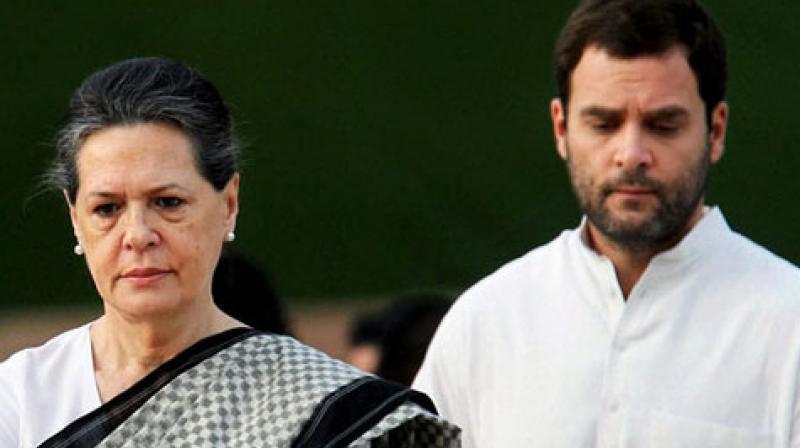Talking Turkey: Will Congress be able to do major surgery?
The paradox is that without the dynasty the Congress will evaporate.

It is sad to see a great institution crumble. The Congress is more than just a political party. It’s the movement that won India independence and created the democratic secular state we still live in. Crises have never been far for the party. Indira Gandhi subjected it to two splits to assert her power and it has faced reverses — remember the drubbing it got after Indira called elections after the Emergency? But somehow the woeful results of the Assembly polls in which the Congress lost two states, with Karnataka the only remaining major state also wobbling, feel different. It’s as if the will to revitalise the party is missing, with Congressmen’s reactions varying from seeking surgery to a wholesale changeover to youth.
There is little sense in pretending that the party’s leadership is anything but dynastic. How far Jawaharlal Nehru facilitated the ascent of daughter Indira, one removed, is still a matter of speculation, but the pattern was set with Indira pushing her impetuous ill-fated son Sanjay to power, ultimately setting the stage for elder son Rajiv Gandhi to succeed her after her tragic end. Succeeding members of the family kept alive the template of dynastic succession after Indira’s daughter-in-law
Sonia Gandhi came to the rescue after a period of mourning for husband Rajiv. Dutifully, she led her son Rahul into the party, finally making him vice-president. There lies the rub. Rahul Gandhi, despite his periodic time-outs for contemplation and fighting his demons, has demonstrated he has not inherited the political genes of the family. Mrs Gandhi is not in the best of health and has reached a dead end in dynastic terms. So where does the Congress go from here? We shall have a flood of solutions from partymen and women repeating tired old arguments that will ultimately lead to grand plans ending up in the overflowing party archives.
But before putting all the blame on the Congress, we must remember that dynastic succession is a very Indian tradition, with the head of the household seeing it as his duty to place his son in a profession for his future prosperity. Usually, he thinks of his own profession. A lawyer will apprentice him to a law firm, and by the same logic a politician will nurture him in political life. You only have to look around. The Badals and Mulayam Yadavs are more upfront in promoting their sons, there are a multitude of ministers, state legislators and MPs with sons and daughters in advantageous positions to make the leap when the time comes, even discounting Lalu Prasad Yadav’s experiment in installing his wife as chief minister when he became ineligible. Even the BJP, which used to pride itself as a party with a difference, has numerous children of their partymen and women waiting in the wings.
It is the rule in dynastic systems that courtiers draw a ring around dynasties, isolating them from any dissenting opinion. Therefore, it needs a shrewd leader like Indira, after her initial learning process, to pierce through the wall built around her. Mrs Gandhi, studying her mother-in-law, acquired a measure of her political skills but Rahul Gandhi is still at sea, with partymen perennially complaining he is inaccessible.
For the Congress, the questions raised by its dismal showing in the Assembly polls are existential in nature. The paradox is that without the dynasty the Congress will evaporate as a party as it is now. Also, considering Rahul Gandhi’s performance, Mrs Gandhi is still hesitating to pass on the baton. Rahul’s supporters say he should be given a chance to swim or sink, but if he sinks, then what?
After some two years of the Narendra Modi government in office, the political climate has changed dramatically. The BJP has made no secret of its determination to bury the secular order honed by Jawaharlal Nehru in favour of a majoritarian model. The minorities must live under sufferance and Hindu ideas and symbols must merge with those of the state. The consequences of the new philosophy are unravelling each day. While the BJP is willing to make tactical adjustments in its new projection as a national party (in Kashmir and Punjab, for instance), it is mindful of its goal to convert India into a predominantly Hindu nation.
The BJP has by and large chosen the drip method, though some of its loud-mouthed supporters spoil the show by jumping the gun. One day it is how high the national flag should fly over university buildings, the next day it is prescribing the chant “Om” before starting yoga exercises. Baba Ramdev and Sri Sri Ravi Shankar, among others, fill the role of party divines. The BJP is far from unique in wrapping itself in the national flag to promote its partisan political objectives. Infamously, the fascists and Nazis were conspicuous forerunners in merging their political philosophies with the state. But it is a new experience for India, bred on 60-plus years on the ideal of secularism, however faulty its implementation might have been.
Beyond these trends, is there a place for a party like the Congress in tomorrow’s India? As the Assembly polls show, the trend in opposition to the BJP’s well-oiled machine is towards regional nationalism, apart from the unique brand of Dravidian duopoly evolved in Tamil Nadu. In West Bengal, Mamata Banerjee has shown that she can continue to demolish by regional nationalism the Marxists, who had become the state’s perennial rulers. The problem for the Congress boils down to its ability to surmount the dynasty in order to begin a new innings. Will the party stalwarts even begin to try such an experiment? Senior leader Digvijay Singh, after pleading for major surgery in the party, has handed back the role of surgeons to Mrs Gandhi and her son.

